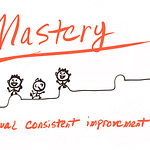This week I took part in an accelerated cohort of hopeful future product managers at the Product School.
Why did I decide to do this? Because I wanted to be legit, to be certified, to appear as if I have the specific prerequisite experience for a full-time product gig in the valley? To be honest, kind of.
But after reading a ton of books on "best product management books" lists since getting to San Francisco less than 100 days ago, I wanted to know if I was really missing anything in my thinking about "product." I wanted to see behind the Silicon Valley product curtain for myself.
By then end of the week, I did get what I came for.
My thinking about what product management really means to both early stage founders and growing businesses alike had been solidified. In this article I'll articulate my thinking about the former, in the context of my own zero-to-one adventures so far.
Startup Founders as Product Managers
It's been said that product managers are the CEO of the product. Some people hate this analogy, and I can see why. Other people think that it's spot on, and I can see why. As a failed startup founder and future serial entrepreneur who expects to be able to both build and sell shitty version 0s of his own products, I really like this idea.
Primarily, I like the idea because if you're a company with one product, which all startups are at first (I suppose you could get more nuanced here talking platforms and marketplaces, but let's not), then your company's vision statement is your product vision. Therefore, your job as founder (i.e., as CEO and everything else) is to sell that product's vision to the world, incrementally, as you figure out how to get it built.
Therefore, startup founders are product managers. They have to be.
"To understand products, it is not enough to understand design or technology. It is critical to understand business." ~ Don Norman, The Design of Everyday Things
Product Management vs. Entrepreneurship; some Analogies
If you read my last blog, you'll know how much I don't like the word entrepreneurship, mainly because it really isn't helpful when it comes to execution.
However, I think that product management actually is helpful.
It's helpful in a tactical way; in a way that can get you on the path to entrepreneurship.
It's helpful in the same way that machine learning can get you on the path to understanding artificial intelligence, or that 3D printing can get you on the path to understanding advanced manufacturing.
It's like back in the day (I'm thinking like the 80's or so?) when if you learned "programming" it would get you on the path to understanding software. Since there are so many types of programming these days though, alas, aiming at programming isn't helpful anymore.
The same will become true of machine learning, 3D printing, and product management. That's why now is a great time to get in on all three of these fronts, even though it won't always be.
Each of these slippery terms continue to expand and multiply within their own accelerating universes. Inevitably, they will all become diluted and abstracted just like entrepreneurship, artificial intelligence, and advanced manufacturing have.
Such is the way of the world.
In a word, abstraction.
To put a sharp point on this idea, product management is a gateway to entrepreneurship.
The Tactical PM and the Strategic Entrepreneur
In my experience, business curriculum for "entrepreneurs" generally focuses quite a bit on other people's businesses through the eyes of the founder or CEO. This is often done by analyzing made up businesses and projecting their cash flows, valuations, operations, costs, who their customers are, etc. Case studies are even "better," primarily because of the richness (read complexity and uncertainty) associated with real-life details like term sheets, concerns of individual characters, equity structures, and on and on.
In reality, it's a whole lot. And this is just the technical business stuff. The best entrepreneurship programs focus deeply on the potential entrepreneur, including their passions, personality, aims, and desires in life.
This, admittedly, is amazingly important stuff, as it helps you figure out your "why" and provides a broad view of tools that you'll need to refer back to along the journey. Like it or not, this is the place where we all really should start.
"First figure out 'What should I be doing? What is something where there is a market that is emerging, there is a product that I can build that I'm excited to work on, and something where I have specific knowledge and I'm really into it?'" ~ Naval Ravikant
Meanwhile, product management curriculum focuses on tying the why to the "what" and "how" through a laser focus on products, including aspects of both building and selling. The beauty of digital product management, moreover - which is naturally the type taught by the Product School in Silicon Valley - is that you essentially remove all of the complexity associated with difficult-to-understand hardware and service businesses.
Basically, you don't try to eat the whole elephant or boil the ocean. To start, you say "OK, what app do I like the best on my computer or my phone, and what could make it even better? Now if I made this "even better" change, would it actually make the company more money?"
The startup founder's perspective on this would be more like "how could I build a new product for my new startup that would solve this problem that I think needs solved on this app that I like." This, of course, is a great way to position your startup for acquisition from day one if you're into that sort of thing.
At this juncture, it's important to distinguish that there two schools of product management thought, two product personas, as it were. The "zero to one" product manager who creates a new product or feature from scratch, and the "optimizer" product manager who gets the 200-click user journey down to 25 clicks. This article is for startup founders, so for all intents and purposes we don't see ourselves in the latter role, at least in the medium to long term.
The bottom line is this: however you figure out what you should be working on, the real product management tactics come into play after you get past this critical step. And of course, your mission for this new startup needs to be broad enough so that each hypothesis you test with your product is one that you can stomach as actually being worthy of your pursuit.
Finding Product-Market-Founder Fit
"If you don't who you are, I can't tell you who you are...Once you create this vision in your mind, it's how am I going to get there now." ~ David Goggins
Once you have your "why," it's time to get to work. This is where the tactics of product management really come into play to allow you to start working towards the ever-elusive product-market-founder fit.
Now, can you get these tactics from reading Marty Cagan's books? Probably. It's certainly where I started. But the level of granularity on the tactics is where Product School really shined for me.
Ignoring all of the "find a job working for somebody else" stuff, the framework for developing a killer product that someone wants to buy is relatively straightforward. All you have to do is to answer each of the following questions, in order, before you can get started:
What is your startup's mission and (product) vision?
Who are the potential customers and users (i.e., the personas)?
What are their unmet needs, problems, or pains?
How will your product create value for them, in general? (this is your value proposition statement)
How will your product create value for them, specifically? What features will your product/solution have to address their needs/problems/pains?
What is your unfair competitive advantage?
What assumptions are you making about all of this shit, in general? List all of them, order ranked. This will help you with interview questions.
All of this sounds familiar, right? It's just the first step in the product development life cycle ; namely, identify? So that's it? That's the great advice? To just start "customer development" after making a lean canvas?
Well, kind of. But there's more. You see, aside from market sizing, research, and competitive analysis that you may or may not really care about until you've actually seen some amount of success with your first company, now it's time to start being your own agile project manager.
As you start the customer development process and get out of the proverbial building to start testing your hypotheses with real people, you want to imagine yourself (as the product manager or head of product) writing razor-sharp Jira tickets for yourself - E-Myth status - as the one who will fulfill each of the following roles and responsibilities:
Product marketing manager: responsible for how the press release reads when this product is done, and determining which traction channels you'll look in to find people that you don't know yet to interview
Sales lead: responsible for nailing down exact personas to target with Facebook-ad fidelity, and then reaching out to these people to sell them on giving your potential product a try
User researcher & data scientist: responsible for designing, planning, and executing qualitative interviews, and for aggregating qualitative interview data into quantitative information
Product development lead, developer & user experience designer: responsible for determining what a minimum viable mockup for testing with users and potential customers actually looks like, and then building it
Product owner and scrum master: responsible for holding everyone on the team accountable every day of the weekly sprints, from the Monday aiming sessions, to the daily stand-ups, to the Friday debrief and retrospective
Product manager: responsible for writing up all of your learnings and sending them out to the team each week, and correspondingly updating your answers to each of the original seven questions
Of course, you're also the CEO, so you want to make sure that you've got skin in the game on this agile project management process and are managing your own top priorities as well as the company's.
The company's number one business objective for this quarter is (naturally) achieving product-market fit, and that's how you will lead off every Monday to fuel up the rest of the team. You'll describe exactly what you've been doing to help achieve this goal over the previous week.
If the O in OKR is product-market fit, what should your Key Results for this next 1-week sprint be? Let's say we just have two for the first week:
Clarify, revisit, and update all 7 of the "before you get started" questions at the end of the week
Perform relevant work for each of the 7 positions mentioned above (i.e., product marketing manager, sales lead, UX researcher/data scientist, dev lead/developer/UX designer, product owner/scrum master, product manager, and CEO)
Remember, execution is everything.
The Rest of the Product Development Life Cycle
As a startup founder, 6 months to a year down the line is essentially eternity away, and so it's probably not worthwhile to focus on anything beyond the next few weeks while in zero-to-one mode.
The key number at this stage of the game is one. Then it's two, then three, and so on. By the time qualitative interviews, quantitative numbers, and customer feedback on prototypes from people identified through specific channels begin to converge, it's time to take it to the next level. As our startup grows, so will our product. We will have to be the CEO of the product that grows with it.
But that's an article for another day.
PS...in cases you're interested, here are my favorite top 10 zero-to-one product management books and top 10 founder strategy books so far to help you along your journey.
Cheers,
Greg












